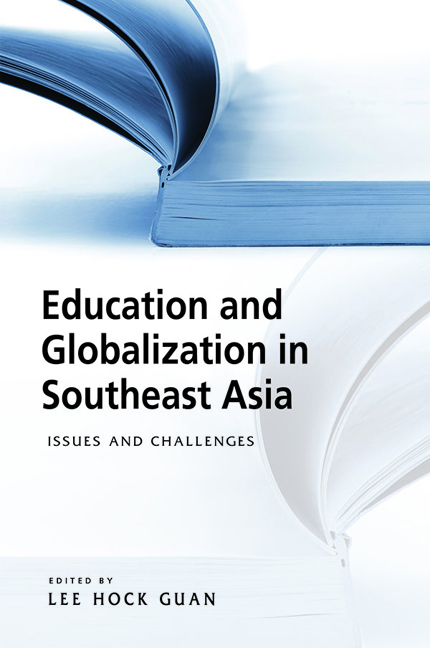Book contents
- Frontmatter
- Contents
- Acknowledgements
- Contributors
- Introduction
- 1 English in Singapore and Malaysia: Common Roots, Different Fruits
- 2 Globalization, Educational Language Policy and Nation-Building in Malaysia
- 3 Second-Order Change Without First-Order Change: A Case of Thai Internationalization of Higher Education
- 4 Higher Education in Malaysia: Access, Equity and Quality
- 5 Indonesian Higher Education: Gaps in Access and School Choice
- 6 Increasing Access to and Retention in Primary Education in Malaysia
- 7 Primary and Secondary Education in Myanmar: Challenges Facing Current Reforms
- Index
4 - Higher Education in Malaysia: Access, Equity and Quality
Published online by Cambridge University Press: 12 January 2018
- Frontmatter
- Contents
- Acknowledgements
- Contributors
- Introduction
- 1 English in Singapore and Malaysia: Common Roots, Different Fruits
- 2 Globalization, Educational Language Policy and Nation-Building in Malaysia
- 3 Second-Order Change Without First-Order Change: A Case of Thai Internationalization of Higher Education
- 4 Higher Education in Malaysia: Access, Equity and Quality
- 5 Indonesian Higher Education: Gaps in Access and School Choice
- 6 Increasing Access to and Retention in Primary Education in Malaysia
- 7 Primary and Secondary Education in Myanmar: Challenges Facing Current Reforms
- Index
Summary
BACKGROUND
Since independence in 1957, Malaysia has transformed itself from an agrarian to an increasingly industrial and globalized economy. Malaysia was formed in 1963 comprising Malaya, Sabah, Sarawak and Singapore, with the last leaving the group in 1965. In the country of 30-odd million, 62.1 per cent are Malays and other indigenous groups, 21.8 per cent Chinese, 6.5 per cent Indians and 9.6 per cent Others (includes 8.7 per cent non-citizens). Malaya and Singapore were served by the University of Malaya (UM), located in Singapore, until 1957 when a branch campus was established in Kuala Lumpur. In 1962, it split into two entities, University of Malaya and University of Singapore, as befits the two sovereign states.
Formal steps were taken post-independence to develop higher education institutions to provide the high-level skills that the industrializing nation required. These aspirations took particular shape after the civil disturbances of 1969. Higher education in Malaysia expanded exponentially over the last four decades with dramatic improvement in access to public and private higher education institutions (HEIs). The factors contributing to increased access were primarily high secondary enrolment and completion, building on democratization and universalization of the system; an increasingly diversified institutional pattern of universities, colleges, polytechnics and community colleges catering to various levels of achievement; a burgeoning private higher education sector as a result of liberalization policies; and a combination of public and private sources in the financing of HEIs.
This chapter examines current higher education policies and implementation in Malaysia, understanding their historical antecedents in relation to higher education access, equity and quality issues. The issues are analysed within the overall context of the need for well-qualified and highly skilled graduate participation in an increasingly globalized knowledge-based economy with the goal of reaching high income status as envisioned by Vision 2020 (Mohamad 1991). The key challenge is human capital growth. Underlying the discussion is the question: which policies and actions have worked, and which need to be reviewed and adjusted to ensure that the nation's talent pool will match the demands of a high income, knowledge economy?
METHODOLOGY AND DATA
The study draws heavily on government documentation issued by the Ministry of Education (MOE), the Ministry of Higher Education (MOHE), and the Department of Statistics, particularly its Census Reports and Labour Force Surveys. Data provided by officials and politicians to the press have been included.
- Type
- Chapter
- Information
- Education and Globalization in Southeast AsiaIssues and Challenges, pp. 83 - 110Publisher: ISEAS–Yusof Ishak InstitutePrint publication year: 2017



